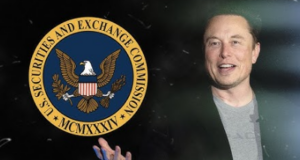Elon Musk’s Department of Government Efficiency (DOGE) is ramping up its scrutiny of federal agencies, with the U.S. Securities and Exchange Commission (SEC) becoming its latest focus. DOGE’s SEC affiliate is actively encouraging the public to report cases of waste, fraud, and misconduct within the regulatory body. This bold move has stirred political and regulatory debates, with some questioning Musk’s intentions and the potential conflicts of interest involved.
DOGE’s Growing Influence in Federal Oversight
Musk’s DOGE initiative has rapidly expanded across various government agencies, establishing over 30 affiliate pages on X (formerly Twitter). One of the most recent additions, DOGE SEC, has taken a proactive stance in identifying6 inefficiencies within the SEC.
On February 17, DOGE SEC posted:
- “DOGE is seeking help from the public! Please DM this account with insights on finding and fixing waste, fraud, and abuse relating to the Securities and Exchange Commission.”
This aligns with Musk’s broader mission to streamline government8 efficiency but has also raised concerns about his vested interest in regulatory affairs. Additionally, Musk has suggested that DOGE could contribute to curbing U.S. inflation by tackling government overspending, further adding to the conversation around his initiative’s potential impact.
Rising Political and Regulatory Concerns
Musk’s long-standing tension with the SEC has been well-documented, including a recent lawsuit alleging he underpaid Twitter stock investors by over $150 million. In response, Musk has been vocal about his criticism, labeling the SEC as a “broken organization” that neglects serious financial crimes.
Lawmakers, particularly Democrats like Maxine Waters, have voiced concerns about DOGE’s intentions. The biggest concern revolves around Musk gaining access to the Consolidated Audit Trail (CAT), a system that tracks all U.S. stock trades. Critics worry that such access could provide Musk with insider-level market data, potentially benefitingq his financial interests.
One lawmaker reportedly warned:
- “This is the single largest treasure trove that he can pillage for his personal gain or vendetta.”
DOGE Expands Its Reach: IRS and Student Loan Records Under Review
Beyond the SEC, DOGE has also made headway in other financial sectors. A federal judge ruled on February 17 that DOGE could legally access federal student loan records. Additionally, the initiative is now seeking entry into IRS taxpayer data, signaling a larger effort to enhance transparency in federal financial operations.
In response to conflict-of-interest concerns, the White House has stated that President Trump would not allow any misuse of government data. Musk himself has pledged to remain uninvolved in direct oversight to ensure neutrality.
What This Means for U.S. Financial Regulation
DOGE’s aggressive push into financial oversight could significantly impact regulatory agencies, potentially driving greater transparency and accountability. However, skeptics argue that Musk’s previous legal battles and personal conflicts with regulators cast doubt on his true motives.
Is this a genuine effort to reform inefficient government agencies, or is it a calculated move against regulatory bodies that have challenged him in the past?
Regardless of the outcome, this unfolding battle between Musk’s DOGE and the SEC could reshape federal regulatory practices, setting a precedent for private sector influence in government oversight.
Also Check:
- Why Is Crypto Crashing and Will It Recover? Key Factors Explained
- PAWS Token Allocation Checker and Listing Updates
- Solana Crash Today: Will $SOL Price Recover or Drop Further?
- XRP News Today: Why Is $XRP Price Dropping & Will It Recover?
- BitcoinOS Launches Grail Bridge: A Game-Changer for Bitcoin Users
- Will Blum and Pi Coin Be Listed on Binance? Major Update Ahead
- $TAPS Token Price After TapSwap Listing: What’s Next for Its Future?
- Zoo Token Listed on KuCoin: Complete Guide and Key Details
- Pi Network Binance Listing Speculation: Is Binance Hinting Yes?
